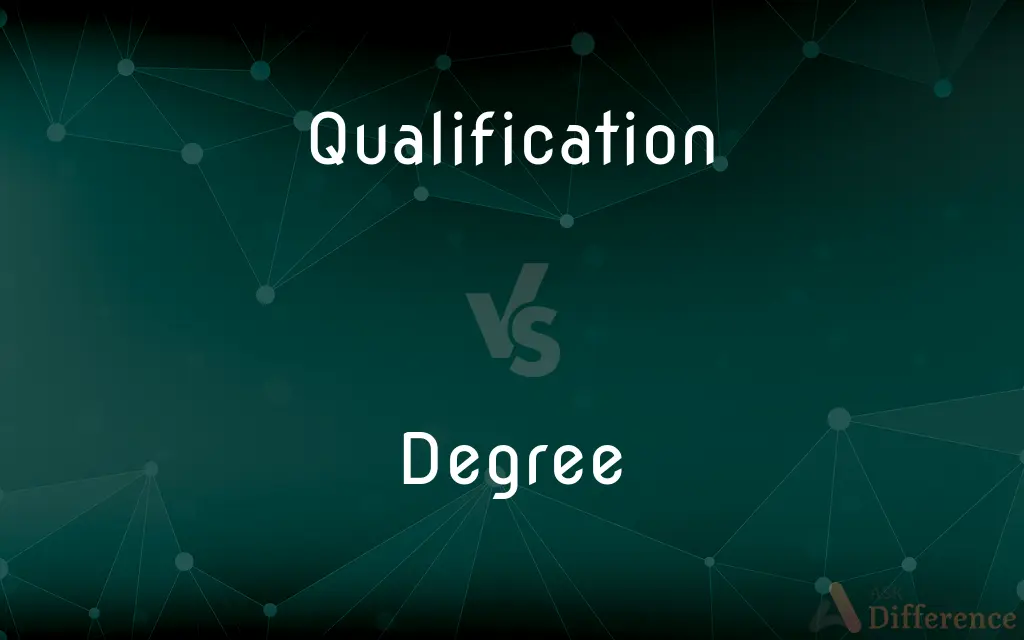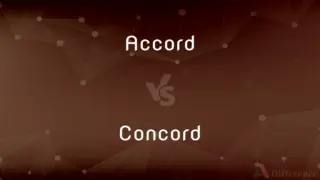Qualification vs. Degree — What's the Difference?
Edited by Tayyaba Rehman — By Urooj Arif — Updated on April 4, 2024
A qualification encompasses any educational achievement, whereas a degree is a specific type of qualification awarded by colleges or universities.

Difference Between Qualification and Degree
Table of Contents
ADVERTISEMENT
Key Differences
Qualifications refer to the attainment of educational or skill milestones, which can range from diplomas to certificates and degrees. These are evidence of an individual's competencies or abilities in various fields. On the other hand, a degree is a subset of qualifications specifically conferred by higher education institutions, such as universities, after the completion of a rigorous course of study.
Qualifications are broader in scope, including professional certifications, apprenticeships, and vocational training achievements, highlighting practical skills and theoretical knowledge. Whereas degrees focus primarily on academic research and study, often requiring a deep dive into theoretical aspects of a subject area.
The value of a qualification can vary widely depending on the field, the level of expertise it signifies, and the institution or organization awarding it. In contrast, degrees are generally standardized in terms of levels (associate, bachelor's, master's, doctorate) and are recognized internationally, providing a common framework for academic achievement.
Qualifications can be obtained in a shorter amount of time, sometimes within a few weeks or months for certain certificates or diplomas. Degrees, however, usually require a minimum of two years of study, with bachelor's degrees typically taking four years and postgraduate degrees ranging from one to several years.
Employers often look for specific qualifications depending on the job role. Some positions may require vocational training or certifications rather than a degree. Conversely, many professional careers, particularly in fields such as medicine, law, and academia, necessitate holding a degree as a fundamental entry requirement.
ADVERTISEMENT
Comparison Chart
Definition
An accomplishment or certificate proving a person's ability in a specific area.
A specific type of academic award from a college or university.
Types
Diplomas, certificates, apprenticeships, professional certifications.
Associate, bachelor's, master's, doctorate.
Duration
Can vary from a few weeks to several years.
Generally requires at least two years, often four for undergraduates.
Scope
Broad, covering academic, professional, and vocational areas.
Primarily academic, focusing on theoretical knowledge and research.
Recognition
Depends on the field and issuing body.
Widely recognized and standardized internationally.
Compare with Definitions
Qualification
Completion of an apprenticeship in a trade.
After his apprenticeship, he gained a qualification as an electrician.
Degree
An academic award for completing a university program.
She celebrated her achievement of a bachelor's degree in biology.
Qualification
A certificate of completion from a vocational course.
He received his welding qualification last month.
Degree
A recognized standard for academic excellence.
Her degree from a prestigious university opened many doors in her career.
Qualification
A professional certification indicating expertise.
She earned her qualification in digital marketing.
Degree
A specific level of academic achievement.
He pursued a master's degree in engineering for better career prospects.
Qualification
Completion of required education for a job.
Her teaching qualification was recognized statewide.
Degree
An undergraduate award before postgraduate study.
Her degree in psychology led her to a career in counseling.
Qualification
Academic achievements besides degrees.
His qualifications include advanced math and science courses.
Degree
A doctorate as the highest level of academic degree.
Achieving his doctorate in philosophy was a decade-long journey.
Qualification
The act of qualifying or the condition of being qualified
Qualification for the tournament will be hard.
Degree
The amount, level, or extent to which something happens or is present
A question of degree
A degree of caution is probably wise
Qualification
A quality, ability, or accomplishment that makes a person suitable for a particular position or task.
Degree
A unit of measurement of angles, one ninetieth of a right angle or the angle subtended by one three-hundred-and-sixtieth of the circumference of a circle
Set at an angle of 45 degrees
Qualification
A condition or circumstance that must be met or complied with
Fulfilled the qualifications for registering to vote.
Degree
A unit in any of various scales of temperature, intensity, or hardness
Water boils at 100 degrees Celsius
Qualification
A restriction or modification
A statement hedged with several qualifications.
Degree
An academic rank conferred by a college or university after examination or after completion of a course, or conferred as an honour on a distinguished person
A degree in zoology
Qualification
The act or process of qualifying for a position, achievement etc.
Qualification for this organization is extraordinarily difficult.
Degree
Social or official rank
Persons of unequal degree
Qualification
An ability or attribute that aids someone's chances of qualifying for something; specifically, completed professional training.
What are your qualifications for this job?
Degree
One of a series of steps in a process, course, or progression; a stage
Proceeded to the next degree of difficulty.
Qualification
(UK) A certificate, diploma, or degree awarded after successful completion of a course, training, or exam.
Degree
A step in a direct hereditary line of descent or ascent
First cousins are two degrees from their common ancestor.
Qualification
A clause or condition which qualifies something; a modification, a limitation.
I accept your offer, but with the following qualification.
Degree
Relative social or official rank, dignity, or position.
Qualification
(obsolete) A quality or attribute.
Degree
Relative intensity or amount, as of a quality or attribute
A high degree of accuracy.
Qualification
The act of qualifying, or the condition of being qualified.
Degree
The extent or measure of a state of being, an action, or a relation
Modernized their facilities to a large degree.
Qualification
That which qualifies; any natural endowment, or any acquirement, which fits a person for a place, office, or employment, or which enables him to sustian any character with success; an enabling quality or circumstance; requisite capacity or possession.
There is no qualification for government but virtue and wisdom, actual or presumptive.
Degree
A unit division of a temperature scale.
Qualification
The act of limiting, or the state of being limited; that which qualifies by limiting; modification; restriction; hence, abatement; diminution; as, to use words without any qualification.
Degree
(Mathematics) A planar unit of angular measure equal in magnitude to 1/360 of a complete revolution.
Qualification
An attribute that must be met or complied with and that fits a person for something;
Her qualifications for the job are excellent
One of the qualifications for admission is an academic degree
She has the makings of fine musician
Degree
A unit of latitude or longitude, equal to 1/360 of a great circle.
Qualification
The act of modifying or changing the strength of some idea;
His new position involves a qualification of his party's platform
Degree
The greatest sum of the exponents of the variables in a term of a polynomial or polynomial equation.
Qualification
A statement that limits or restricts some claim;
He recommended her without any reservations
Degree
The exponent of the derivative of highest order in a differential equation in standard form.
Degree
An academic title given by a college or university to a student who has completed a course of study
Received the Bachelor of Arts degree at commencement.
Degree
A similar title conferred as an honorary distinction.
Degree
(Law) A division or classification of a specific crime according to its seriousness
Murder in the second degree.
Degree
A classification of the severity of an injury, especially a burn
A third-degree burn.
Degree
(Grammar) One of the forms used in the comparison of adjectives and adverbs. For example, tall is the positive degree, taller the comparative degree, and tallest the superlative degree of the adjective tall.
Degree
One of the seven notes of a diatonic scale.
Degree
A space or line of the staff.
Degree
A stage of proficiency or qualification in a course of study, now especially an award bestowed by a university or, in some countries, a college, as a certification of academic achievement. (In the United States, can include secondary schools.)
She has two bachelor's degrees and is studying towards a master's degree.
Degree
(geometry) A unit of measurement of angle equal to 360 of a circle's circumference.
A right angle is a ninety-degree angle.
Most humans have a field of vision of almost 180 degrees.
Degree
(physics) A unit of measurement of temperature on any of several scales, such as Celsius or Fahrenheit.
180 degrees Fahrenheit is equivalent to 100 degrees Celsius.
Water boils at 100 degrees Celsius.
Degree
(algebra) The sum of the exponents of a term; the order of a polynomial.
A quadratic polynomial is a polynomial of degree 2.
Degree
The dimensionality of a field extension.
The set of complex numbers constitutes a field extension of degree 2 over the real numbers.
The Galois field has degree 3 over its subfield
Degree
(graph theory) The number of edges that a vertex takes part in; a valency.
Degree
(logic) The number of logical connectives in a formula.
Degree
(surveying) The curvature of a circular arc, expressed as the angle subtended by a fixed length of arc or chord.
Degree
(geography) A unit of measurement of latitude and longitude which together identify a location on the Earth's surface.
Degree
(grammar) Any of the three stages (positive, comparative, superlative) in the comparison of an adjective or an adverb.
Degree
A step on a set of stairs; the rung of a ladder.
Degree
An individual step, or stage, in any process or scale of values.
Degree
A stage of rank or privilege; social standing.
Degree
(genealogy) A ‘step’ in genealogical descent.
Degree
One's relative state or experience; way, manner.
Degree
The amount that an entity possesses a certain property; relative intensity, extent.
To what degree do the two accounts of the accident concur?
Degree
A step, stair, or staircase.
By ladders, or else by degree.
Degree
One of a series of progressive steps upward or downward, in quality, rank, acquirement, and the like; a stage in progression; grade; gradation; as, degrees of vice and virtue; to advance by slow degrees; degree of comparison.
Degree
The point or step of progression to which a person has arrived; rank or station in life; position.
Degree
Measure of advancement; quality; extent; as, tastes differ in kind as well as in degree.
The degree of excellence which proclaims genius, is different in different times and different places.
Degree
Grade or rank to which scholars are admitted by a college or university, in recognition of their attainments; also, (informal) the diploma provided by an educational institution attesting to the achievement of that rank; as, the degree of bachelor of arts, master, doctor, etc.; to hang one's degrees on the office wall.
The youth attained his bachelor's degree, and left the university.
Degree
Three figures taken together in numeration; thus, 140 is one degree, 222,140 two degrees.
Degree
State as indicated by sum of exponents; more particularly, the degree of a term is indicated by the sum of the exponents of its literal factors; thus, a2b3c is a term of the sixth degree. The degree of a power, or radical, is denoted by its index, that of an equation by the greatest sum of the exponents of the unknown quantities in any term; thus, ax4 + bx2 = c, and mx2y2 + nyx = p, are both equations of the fourth degree.
Degree
A 360th part of the circumference of a circle, which part is taken as the principal unit of measure for arcs and angles. The degree is divided into 60 minutes and the minute into 60 seconds.
Degree
A division, space, or interval, marked on a mathematical or other instrument, as on a thermometer.
It has been said that Scotsmen . . . are . . . grave to a degree on occasions when races more favored by nature are gladsome to excess.
Degree
A position on a scale of intensity or amount or quality;
A moderate degree of intelligence
A high level of care is required
It is all a matter of degree
Degree
A specific identifiable position in a continuum or series or especially in a process;
A remarkable degree of frankness
At what stage are the social sciences?
Degree
An award conferred by a college or university signifying that the recipient has satisfactorily completed a course of study;
He earned his degree at Princeton summa cum laude
Degree
A unit of temperature on a specified scale;
The game was played in spite of the 40-degree temperature
Degree
A measure for arcs and angles;
There are 360 degrees in a circle
Degree
The highest power of a term or variable
Degree
The seriousness of something (e.g., a burn or crime);
Murder in the second degree
A second degree burn
Common Curiosities
How long does it take to get a degree?
It typically takes four years for an undergraduate degree, one to two years for a master's, and several years for a doctorate.
What is a qualification?
A qualification is a recognition of an individual's skills, knowledge, or competence in a specific area, acquired through study or training.
Can qualifications vary in value?
Yes, the value of qualifications can differ based on the field, the issuing body, and the market demand.
Can a degree be considered a qualification?
Yes, a degree is a type of qualification, specifically relating to higher education.
Are qualifications only academic?
No, qualifications can be academic, professional, or vocational.
Is a doctorate the highest degree?
Yes, a doctorate is generally considered the highest level of academic degree.
What's the difference between a bachelor's and a master's degree?
A bachelor's degree is an undergraduate program, while a master's is a postgraduate program requiring the completion of a bachelor's degree.
What is a degree?
A degree is a formal academic award conferred by colleges or universities to signify successful completion of a particular program of study.
What types of qualifications exist?
Qualifications include professional certifications, diplomas, apprenticeships, degrees, and more.
Are qualifications the same worldwide?
While the concept of qualifications is global, the specifics and recognition can vary by country and industry.
Do qualifications expire?
Some qualifications, especially in rapidly changing fields like technology or healthcare, may require periodic renewal or continuing education.
Do all jobs require a degree?
No, job requirements vary, with some requiring specific vocational qualifications or certifications instead of a degree.
Can I obtain a qualification online?
Yes, many institutions and organizations offer online courses leading to various qualifications, including degrees.
Is a degree always necessary for a successful career?
Not always; many successful careers are built on vocational training, professional certifications, or practical experience.
How do employers view qualifications vs. degrees?
Employers value both, but the importance varies by job. Some roles require specific degrees, while others prioritize practical skills and certifications.
Share Your Discovery

Previous Comparison
Accord vs. Concord
Next Comparison
Cod vs. TomcodAuthor Spotlight
Written by
Urooj ArifUrooj is a skilled content writer at Ask Difference, known for her exceptional ability to simplify complex topics into engaging and informative content. With a passion for research and a flair for clear, concise writing, she consistently delivers articles that resonate with our diverse audience.
Edited by
Tayyaba RehmanTayyaba Rehman is a distinguished writer, currently serving as a primary contributor to askdifference.com. As a researcher in semantics and etymology, Tayyaba's passion for the complexity of languages and their distinctions has found a perfect home on the platform. Tayyaba delves into the intricacies of language, distinguishing between commonly confused words and phrases, thereby providing clarity for readers worldwide.
















































